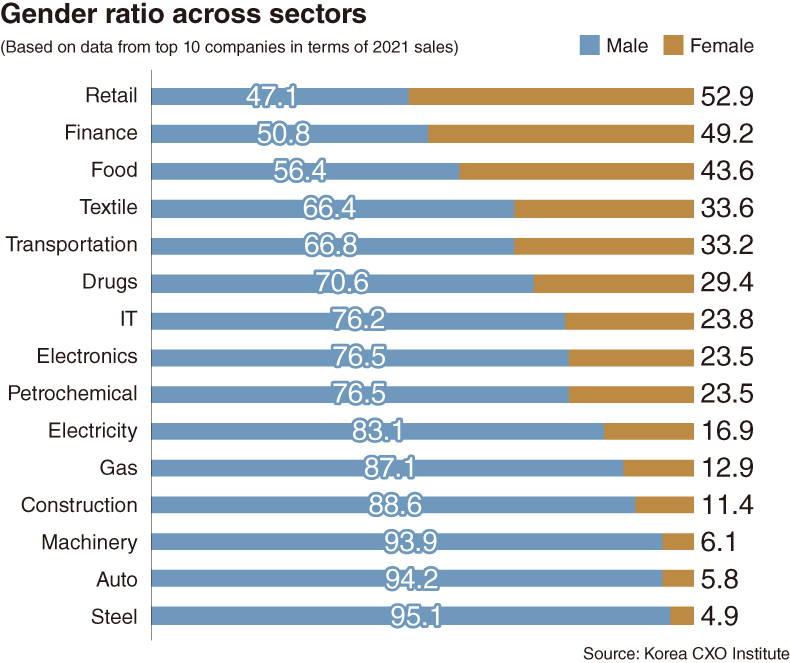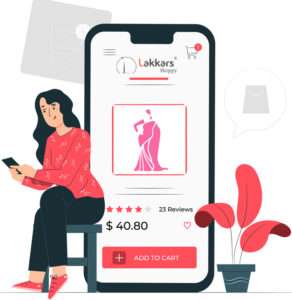
Women make up just 32% of the workforce at major companies
Only 1 out of 4 employees working at major Korean companies were women, with their average yearly income some 30 per cent less than that of the men at the companies, according to a report from market tracker Korea CXO Institute.
Korea CXO Institute analyzed the 15 South Korean companies with the highest sales across 10 different sectors, in a bid to gain insight into the gender ratio in the Korean workspace and the wage gap between Korean male and female employees.
According to the results, the number of employees of analyzed companies totalled 844,064, and, among them, 24 per cent were women.
Meanwhile, the average salary of male employees at 150 companies logged 79.7 million won ($61,400) a year, while that of female employees stood at 54.2 million won.
The data connotes that for their annual salary, Korean women on average made 68 per cent of male employees’ annual salary.
According to the report, the gender ratio in the Korean workspace differed greatly by industry.
Almost half of the employees working in the retail sector and the finance sector were female, while only 4.7 per cent of total employees working in the steel industry were found to be women.
By company, the female ratio was highest at Lotte Shopping, with women there accounting for more than 70 per cent of the workspace.
Korean beauty giant Amorepacific followed next, with 66.9 per cent of its total workers being female.
Meanwhile, South Korean car manufacturer Sungwoo HiTech recorded the lowest rate for female employment, with only 2.75 per cent of entire employees female.
Korean auto parts maker Hanon Systems came next, with 61 employees out of 2,194 employees female, or 2.78 per cent.
The wage gap between men and women

The discrepancy between female and male employees was also found in the number of wages recorded, as the data showed that for two straight years from 2020 to 2021, women made some 30 per cent less than men in general.
According to the analysis, none of the companies were analyzed to have female employees who received more in average annual salary than their male colleagues.
The pay gap between men and women was the largest in the construction industry, as women received 51.3 million won, while male employees received 95 million won in their annual yearly income. That equates to women making 54 per cent of what male employees would make in a year in construction.
The finance sector followed suit, with women making some 60 per cent of what men made.
The pay gap was the smallest in the pharmaceutical industry, with female employees paid an average of 58.6 million won — 77.1 per cent of that received by male employees. The automobile industry came next, with female employees making 75.6 per cent of the salary made by men.
According to the report, the highest-paid women worked in the data and communications sector, making an average of 75.2 million won per year.
Female workers working in the finance sector were paid the second-highest at 74.2 million won, followed by those in the automobile industry at 61.2 million won.
By company, women working at Samsung Electronics were paid the most, with a yearly income of 97.7 million won.
The next highest-paid female employees were found to be working at South Korean brokerage firms such as NH Investment & Securities (97.5 million won) and Mirae Asset Securities (92.1 million won), followed by tech giant Naver (91.1 million won).
“If environmental, social and transparent management policies are further strengthened in the future, companies would adhere to strict diversity values,” said Oh Il-sun, head of the CXO Research Institute.
“(If such values are endorsed), industries with few female workers will gradually increase the ratio of female employees (in the industry) while narrowing the salary gap between men and women.”

Ms Jung So-min is an Author from south Korea for Lakkars Magazine she is the Head of East Asia.


